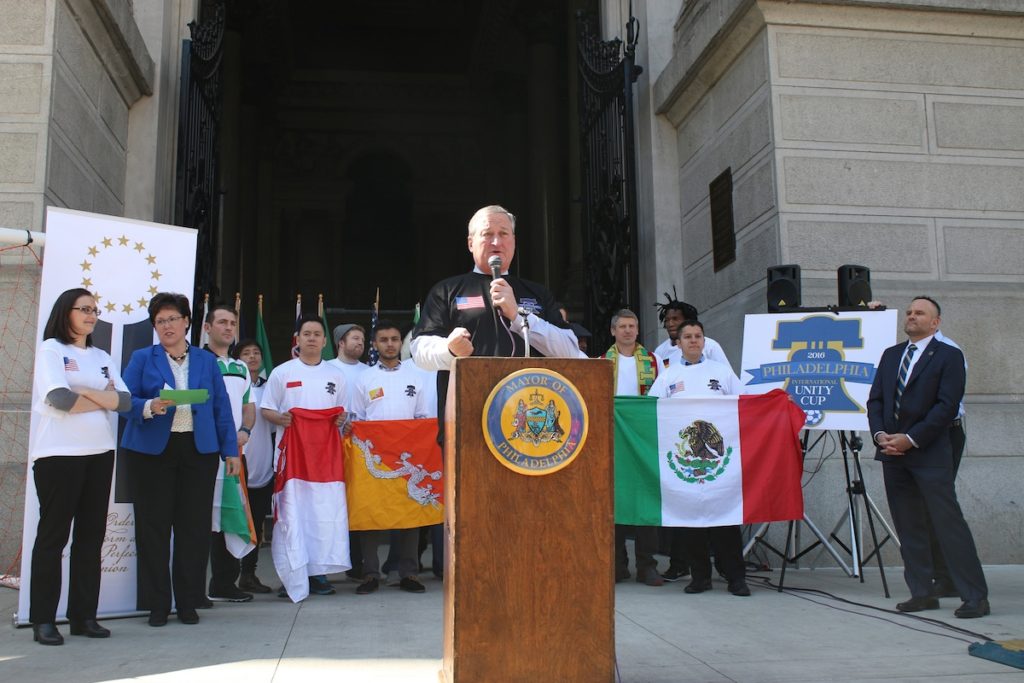A day in the life of Philadelphia’s director of immigrant affairs, Miriam Enriquez
 July 5, 2017
Category: Featured, Long, People
July 5, 2017
Category: Featured, Long, People
Miriam Enriquez describes her pathway to working in immigrant affairs as a bit unconventional.
She’s a lawyer by trade and worked as a prosecutor in Philadelphia for seven years. She’s also always felt a personal connection to immigration.
Although she was born in the United States, she spent the early years of her life living in Central America until moving to the Philadelphia suburbs when she was 7.
“I sort of had an immigrant experience coming here,” said Enriquez, the director of the city’s Office of Immigrant Affairs (OIA). “My family didn’t know about [English as a Second Language] classes, so they just put me in school,” she said. “I don’t really remember learning English until I was in fifth grade.”
In her position within the city’s OIA, Enriquez focuses much on policy and cultural programming like June’s Immigrant Heritage Month. At the month’s closing event on Friday, the city and other partners unveiled an online interactive map that locates ESL classes throughout Philadelphia.
In the last six months, however, her office has also had to work much on calming fears within immigrant communities and clarifying Philadelphia’s status as a sanctuary city.
Policy work
Enriquez can recall a trial during her time as a prosecutor in which the judge and defense attorney discussed how to structure a defendant’s sentencing, so as to not trigger deportation.
“I was just blown away by the fact that as prosecutors, we weren’t aware of the collateral consequences of our prosecutions,” Enriquez said. “As I learned more about it, I didn’t always agree that deportation should be part of the punishment.”
In her research and conversations with immigrant communities, she kept hearing about notario fraud, or immigration services fraud. At the time, there were only two other cities in the country that regulated immigration assistance services, which are business that help immigrants with their immigration forms.
“People just take immigrants’ money, they never fill out the [immigration] forms, so it is just straight up theft,” she said.
While working with former City Councilman-at-Large Dennis O’Brien, Enriquez was involved in writing legislation to regulate those businesses in Philadelphia and the corruption and crimes that are sometimes committed within these businesses. She is now working on implementing the legislation, which passed in 2014, in her position within OIA.
In terms of language access, Enriquez said the city’s OIA makes sure that all city departments are delivering services in languages that limited English language communities can understand.
“Someone who is limited English language proficient should have the same experience with the water department that I would,” she said.
Sanctuary city status concerns
Since January, issues surrounding Philadelphia’s status as a sanctuary city — technically, a “fourth amendment city” — have taken up much of Enriquez’s time.
“It ramped up after the election and all of the talk you heard about sanctuary cities,” she said. “We are right in the middle of it. We are constantly talking to other cities about how they are handling it, responding to executive orders.”
Just last week, Enriquez said the city certified with the U.S. Department of Justice that it is in compliance with a federal law dealing with immigration.
She added that her biggest challenge is conveying to immigrant communities that “Philadelphia has got their back.” There are also concerns from people living in the city who aren’t immigrants about the chances of Philadelphia losing funding from the federal government.
“We are still a welcoming city, but it is hard to balance that with the fact that ICE can still do their job here, so you have to remain vigilant,” she said.
Juliane Ramic, the senior director for refugee and community integration at Nationalities Service Center, said she works with Enriquez and the OIA to assist with issues refugees are having in the city.
“We call on Miriam to connect with us to the right entity in the city,” Ramic said. “She’s been very instrumental, even though we are resettling refugees in a large city, we have a good enough tie to the city so we can say, ‘Yes, Philadelphia will be welcoming refugees.’”

Mayor Jim Kenney announces the inaugural Unity Cup in April 2016; Enriquez is at left in white. (Photo by Samantha Madera, courtesy of Flickr user City of Philadelphia)
Cultural programming
In her first week working in the office, Mayor Jim Kenney approached her about the idea of a Unity Cup.
“The mayor said, ‘I want to have this soccer tournament, it’s kind of going to be like the World Cup,’” she said. “In my head, I was like, ‘I am a lawyer, I have no idea how to plan a soccer tournament.’”
The Philadelphia International Unity Cup is a soccer tournament similar to the World Cup that brings together the city’s immigrant communities through sport. From Sept. 8 to 24, the second annual Unity Cup will take place, with nearly 50 countries represented, including a refugee team.
“These different people from different countries were talking to each other like they had known each other their whole lives and they had a shared interest of sport, it brought them together,” she said.
Ultimately, Enriquez’s work is about making Philadelphia the kind of place she, a “sort of” immigrant, wants to live in.
“I love being able to give back to our immigrant communities and you have to recognize how fortunate you have been in your life and I know have been,” she said. “Coming here at 7 years old, I had help and resources that not everyone has and everyone should be able to have that same opportunity.”
Project
Office of Immigrant and Multicultural AffairsTrending News










